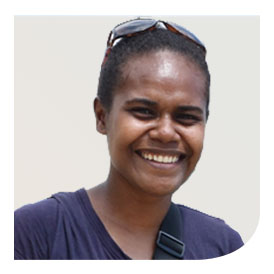 Wendy Beti
Wendy Beti
Degree: Postgraduate Diploma in Climate Change
Graduated: September 2015
Current Employment:
Environment Officer working with the Environment and Conservation Division under the Ministry of Environment Climate Change Disaster Management & Meteorology, Solomon Islands Government
What was your reason for enrolling in a Climate Change degree in PaCE-SD?
During my undergraduate degree studies at the University, I learned a lot about the issues and impacts of climate change. This has led me to want to increase my knowledge in the field of climate change, because it is a cross-cutting issue in all sectors—including waste management which I am heavily involved in–in our Small Islands Developing States. The degree helped me to develop my skills and techniques, and to consider climate change when making decisions in the EIA and V & A processes. More importantly, it has helped me to know how to make better decisions when dealing with risk, vulnerability to disasters and disaster management.
What does your current career involve? (i.e your main responsibilities)
My main responsibilities include ensuring that developments undertaken in the country are sustainable and comply with the Environment Act regulations and the EIA process. I also enforce the pollution control part of the Environment Act to ensure that wastes and chemicals are managed appropriately in the country, during disposal and in the emerging waste streams. My role includes conducting environmental awareness during public events, in schools and communities. Apart from this, we implement other projects under our ministry supported by other donor partners that are aligned with regional and international conventions.
How has your knowledge and skills gained from your studies assisted you and the organisation that you are working in with their duties related to climate change?
The knowledge and skills gained from my postgraduate studies have made me aware of the implications of climate change in the environment sector. During our awareness programs, we try to link waste management to climate change mitigation measures. Under the EIA process in the Solomon Islands, proposed development projects—both private and government–need to consider the potential impacts to the environment and community. Vulnerability and hazard risks must be considered by the project.
Can you tell us about any success stories in your career after you have graduated that you believe was made possible with your study experience at PaCE-SD?
Prior to my graduation in 2015, I contributed to the development of a Regional Waste Management Guidebook. The guidebook was facilitated by the J-PRISM Project and SPREP in a waste characterization study in the Solomon Islands. The guidebook is yet to be finalized and launched.
What have you done differently/better now in your job after graduation?
Currently, I am engaged in dealing with wastes and pollution. For the past five years we have implemented a regional project known as the J-PRISM Project that is also being implemented in another ten PICs. We are now in the process of going into the J-PRISM Phase II project. From time to time, we try to work closely with our climate change division to conduct joint environmental awareness programs and to collaborate in some programs and projects.
What ambitions do you have for the future in your career?
My ambition is to continue further in my career to pursue my master’s degree program in the field of waste management.
What are you most proud of in your life? (Can be a personal achievement or work related).
I am proud to have reached where I am today. I love my job, although it is frustrating and challenging sometimes. I have learned a lot from the people I work with and have interacted with.
What inspires you to pursue the type of work that you are in?
I was inspired to pursue the type of work that I am currently in by my interest and passion for the environment. I grew up in the city, and going back to my parents’ home village in the rural community was always something I looked forward to when I was little. I especially enjoyed going fishing, swimming in the river, going to the garden, taking a walk in the forest or just paddling a canoe.
Who is your role model and why?
My role model is my mother because despite facing a lot of challenges in her life she manages to overcome those challenges and move forward. It takes a lot of courage and determination. Without her support and care I would not be where I am today.